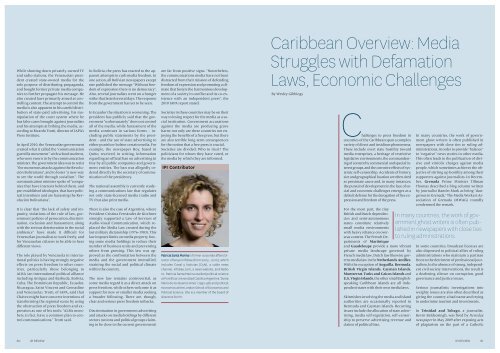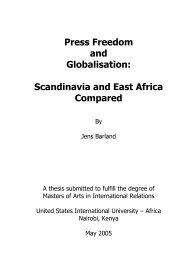FOCUS ON THE AMERICAS - International Press Institute
FOCUS ON THE AMERICAS - International Press Institute
FOCUS ON THE AMERICAS - International Press Institute
You also want an ePaper? Increase the reach of your titles
YUMPU automatically turns print PDFs into web optimized ePapers that Google loves.
While shutting down privately-owned TV<br />
and radio stations, the Venezuelan president<br />
created state-owned media for the<br />
sole purpose of distributing propaganda,<br />
and bought former private media companies<br />
to further propagate his message. He<br />
also created laws primarily aimed at controlling<br />
content. The attempt to control the<br />
media is also apparent in his careful distribution<br />
of state-paid advertising, his manipulation<br />
of the court system where he<br />
has false cases brought against journalists<br />
and his attempts at bribing the media, according<br />
to Ricardo Trotti, director of IAPA’s<br />
<strong>Press</strong> <strong>Institute</strong>.<br />
In April 2010, the Venezuelan government<br />
created what it called the “communication<br />
guerrilla movement” with school students,<br />
who were sworn in by the communication<br />
minister. The government idea was to resist<br />
"the numerous attacks against the Revolución<br />
Bolivariana”, and to foster “a new way<br />
to see the world through socialism". The<br />
communication minister spoke of “companies<br />
that have interests behind them, and<br />
pre-established ideologies, that have political<br />
intentions and are harassing the Revolución<br />
Bolivariana”.<br />
It is clear that “the lack of safety and impunity,<br />
violations of the rule of law, government<br />
policies of persecution, discrimination,<br />
exclusion and harassment, along<br />
with the serious deterioration in the social<br />
ambience” have made it difficult for<br />
Venezuelan journalists to work freely, and<br />
for Venezuelan citizens to be able to hear<br />
different views.<br />
The role played by Venezuela in international<br />
politics is having strongly negative<br />
effects on press freedom in other countries,<br />
particularly those belonging to<br />
ALBA (an international political alliance<br />
including Antigua and Barbuda, Bolivia,<br />
Cuba, The Dominican Republic, Ecuador,<br />
Nicaragua, Saint Vincent and Grenadine<br />
and Venezuela). Trotti, of IAPA, said that<br />
Chávez might have concrete intentions of<br />
transforming the regional scene by using<br />
the obstruction of press freedom and expression<br />
as one of his tools: “ALBA members,<br />
in fact, have a common plan to control<br />
communications,” Trotti said.<br />
In Bolivia, the press has reacted to the apparent<br />
attempts to curb media freedom. In<br />
one action, all Bolivian newspapers except<br />
one published the message “Without freedom<br />
of expression there is no democracy”.<br />
Also, several journalists went on a hunger<br />
strike that lasted several days. The response<br />
from the government has yet to be seen.<br />
In Ecuador the situation is worsening. The<br />
president has publicly said that the government<br />
“unfortunately” does not control<br />
all of the media, while harassment of the<br />
media continues in various forms – including<br />
public statements by the president<br />
- and the use of state advertising to<br />
either punish or bolster certain media. For<br />
example, the newspaper Hoy, based in<br />
Quito, received, in writing, information<br />
regarding an official ban on advertising in<br />
Hoy by all public companies and government<br />
entities. The ban was allegedly ordered<br />
directly by the secretary of communication<br />
of the presidency.<br />
The national assembly is currently studying<br />
a communications law that regulates<br />
not only state-licensed media (radio and<br />
TV) but also print media.<br />
There is also the case of Argentina, where<br />
President Cristina Fernández de Kirchner<br />
strongly supported a Law of Services of<br />
Audio-visual Communication, which replaced<br />
the Media Law created during the<br />
last military dictatorship (1976-1983). This<br />
law imposes limits on media property, forcing<br />
some media holdings to reduce their<br />
number of business units and preventing<br />
others from growing. This law was approved<br />
as the confrontation between the<br />
media and the government intensified,<br />
straining the social and political climate<br />
within the country.<br />
The new law remains controversial, as<br />
some media regard it as a direct attack on<br />
press freedom, while others welcome it as<br />
support for new or smaller media seeking<br />
a broader following. There are, though,<br />
clear and serious press freedom setbacks.<br />
Discrimination in government advertising<br />
and attacks on media holdings by different<br />
sectors (unions and political groups claiming<br />
to be close to the current government)<br />
are far from positive signs. “Nonetheless,<br />
the communications media have not been<br />
distracted from their mission of defending<br />
freedom of expression and promoting a climate<br />
that fosters the harmonious development<br />
of a society in conflict and its co-existence<br />
with an independent press”, the<br />
2010 IAPA report stated.<br />
Societies in these countries may be on their<br />
way to losing respect for the media as a social<br />
institution. Government accusations<br />
against the media are producing grave<br />
harm: not only are these countries not enjoying<br />
the benefits of a free press, but there<br />
are also terrible long-term consequences<br />
for the notion that a free press is crucial.<br />
Societies are divided: Who to trust? The<br />
politicians for whom they have voted, or<br />
the media by which they are informed.<br />
IPI Contributor<br />
Patricia Santa Marina is former corporate affairs Director<br />
of Grupo Infobae (from 2003 - 2010), which<br />
includes Canal 5 Noticias (C5N), a cable news<br />
channel, Infobae.com, a news website, and Radio<br />
10. Patricia Santa Marina studied political science<br />
at Pontificia Universidad Católica Argentina ‘Santa<br />
María de los Buenos Aires’ (1992-98) and political<br />
economics at the London School of Economics and<br />
Political Science. She is a member of the board of<br />
directors for IPI.<br />
Caribbean Overview: Media<br />
Struggles with Defamation<br />
Laws, Economic Challenges<br />
By Wesley Gibbings<br />
Challenges to press freedom in<br />
countries of the Caribbean span a complex<br />
variety of direct and insidious phenomena.<br />
These include overt state hostility toward<br />
media enterprises, a heritage of restrictive<br />
legislative environments, the commandeering<br />
of content by commercial and special interest<br />
groups, and the corrosive effects of systemic<br />
self-censorship. Accidents of history,<br />
size and geographical location are often cited<br />
as proximate cause and, in many instances,<br />
the pursuit of development in the face of social<br />
and economic challenges emerges as a<br />
default defense for the derogation of free expression<br />
and freedom of the press.<br />
For the most part, the tiny<br />
British and Dutch dependencies<br />
and semi-autonomous<br />
states constitute relatively<br />
small media environments<br />
with heavy reliance on overseas<br />
content. The French Departments<br />
of Martinique<br />
and Guadeloupe provide a more vibrant<br />
private media landscape governed by<br />
French media law. Dutch law likewise governs<br />
media law in the Netherlands Antilles.<br />
With the exception of Anguilla, Bermuda,<br />
British Virgin Islands, Cayman Islands,<br />
Montserrat, Turks and Caicos Islands and<br />
U.S. Virgin Islands, the other small Englishspeaking<br />
Caribbean islands are all independent<br />
states with their own media laws.<br />
Skirmishes involving the media and island<br />
authorities are occasionally reported in<br />
Bermuda and Cayman Islands. Recurring<br />
issues include the allocation of state advertising,<br />
media self-regulation, self-censorship<br />
to preserve advertising revenue and<br />
claims of political bias.<br />
In many countries, the work of government<br />
ghost writers is often published in<br />
newspapers with close ties to ruling administrations,<br />
in order to provide “balance”<br />
to “negative” news stories in other media.<br />
This often leads to the publication of divisive<br />
and vitriolic charges against media<br />
people, which sometimes achieves the objective<br />
of stirring up hostility among their<br />
supporters against journalists. In December,<br />
Grenada Prime Minister Tillman<br />
Thomas described a blog column written<br />
by journalist Hamlet Mark as being “dangerous<br />
to Grenada.” The Media Workers Association<br />
of Grenada (MWAG) roundly<br />
condemned the remark.<br />
In many countries, the work of government<br />
ghost writers is often published<br />
in newspapers with close ties<br />
to ruling administrations.<br />
In some countries, broadcast licenses are<br />
also dispensed to political allies of ruling<br />
administrations who maintain a partisan<br />
front to the detriment of professional journalism.<br />
In the absence of strong, independent<br />
civil society interventions, the result is<br />
a deafening silence on corruption, good<br />
governance and justice issues.<br />
Serious journalistic investigations into<br />
weighty issues are also often described as<br />
giving the country a bad name and trying<br />
to undermine tourism and investments.<br />
In Trinidad and Tobago, a journalist,<br />
Kevin Baldeosingh, was fired by Newsday<br />
newspaper in May 2009 after exposing acts<br />
of plagiarism on the part of a Catholic<br />
80 IPI REVIEW<br />
IPI REVIEW 81

















